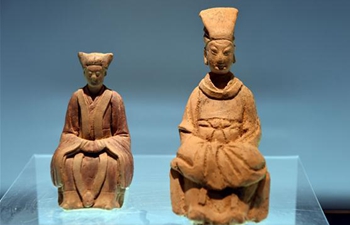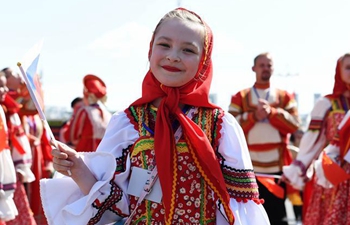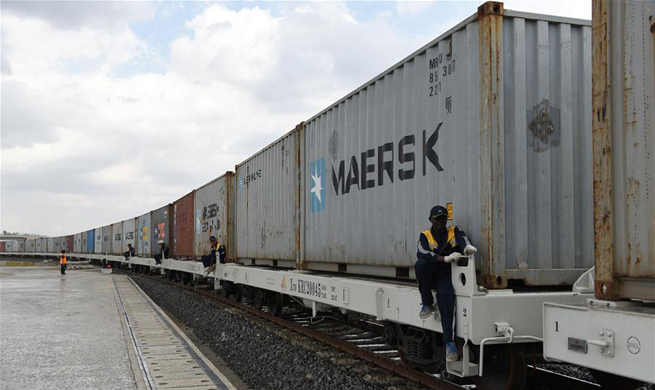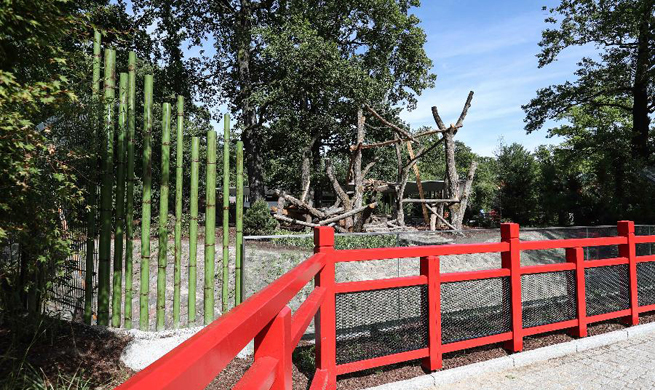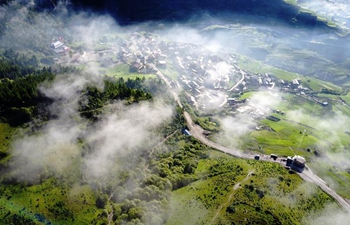ISTANBUL, June 22 (Xinhua) -- The so-called March for Justice, a long-distance protest drawing thousands and roiling Turkey's politics, is continuing amid an escalating war of words between the main opposition and those in power.
The Republican People's Party (CHP), Turkey's largest opposition party, launched the march from Ankara, the capital, to the most populous city of Istanbul last week following the imprisonment of its lawmaker Enis Berberoglu over espionage charges.
"I support the Justice March which is undoubtedly legitimate," Ergun Ozbudun, a professor of constitutional law from Istanbul Sehir University, told Xinhua.
The right to protest and freedom of assembly "are recognized as fundamental rights under both the Turkish Constitution and the universal law," he argued.
The CHP claims that Berberoglu's conviction is the straw that broke the camel's back with regard to the government's violations of the rule of law since last July's coup attempt.
It argues that, based on case law by the Constitutional Court, the arrest of a lawmaker before the end of the parliamentary term is a violation of the law.
Both the CHP and Berberoglu have flatly denied the charges of espionage.
Some of the protesters in the march, including CHP leader Kemal Kilicdaroglu, are holding banners that read "Justice" as they walk on to Istanbul on the highway.
As tensions keep rising, Turkish President Recep Tayyip Erdogan has denounced the march as illegal, saying it is a favor on the part of the government not to block the march.
But his statements were immediately challenged by the opposition.
The claim that the march is carried out thanks to the government's favor "should ring alarm bells for democracy," argued Abdullatif Sener, a former leading figure from the ruling Justice and Development Party (AKP).
"This comes to mean you can do nothing if we (the government) do not want you to," he told Xinhua.
Kilicdaroglu, who initiated the march on June 15, said that he would call any person who talks about a favor in this context a "dictator."
"I'm not walking for myself, but rather for all the victims who seek justice," he said at a CHP parliamentary group meeting held on the way on Tuesday.
The 68-year-old leader cited examples of those victimized due to government actions taken under the rule of emergency, decrying what he called a collapse of the justice system.
A state of emergency was imposed five days after a failed military coup last July, and some 115,000 civil servants, jurists, military and police members and university professors have been suspended or removed based on statutory decrees without court orders.
According to a report by the Organization for Security and Cooperation in Europe in April, 158 media outlets were closed down under the emergency rule.
"This march, which I see as a right act, is a demand for justice," remarked Sener, who cut off his ties with the ruling party in 2008 after serving as a deputy prime minister.
RESTRICTIONS COULD BE IMPOSED BY GOVERNMENT
Erdogan, who is also the head of the AKP, has threatened the main opposition leader with potential prosecution for starting the march.
"It is not right to initiate such a march," he said. "If the justice system also invites you to visit some places, don't be surprised."
In the view of Sener, the president's remarks represent both an instruction to the judiciary and a threat targeting those who may think of joining the march.
The march is not a violation of the law, but rather a peaceful mass protest to call on members of the executive and judiciary to respect the Constitution, Ibrahim Kaboglu, a professor of constitutional law, told Xinhua.
Kaboglu is among hundreds of university professors who were dismissed on statutory decrees in the aftermath of the botched coup.
Eleven deputies of the pro-Kurdish Peoples' Democratic Party, two of whom are its co-chairs, have been arrested on charges of being linked to the Kurdistan Workers' Party, which was branded as a terror group by Ankara for its decades-old armed struggle for autonomy in Turkey's southeast.
Many have long complained even before the coup attempt that the Turkish judiciary was almost totally under the control of the government which uses it as a tool to eliminate dissidents.
"This march is a need, because judicial independence is at its lowest and it is not possible to correct it through judicial means," argued Ozbudun.
The AKP has been criticized for eliminating judicial independence by imposing a tight control over the judiciary, in particular after the country narrowly voted in favor of a switch to an executive presidency in an April referendum.
Erdogan has compared the protesters on the march to members of the military who took part in last year's coup bid. "They were attacking with tanks, cannons. You are now marching on the road," he said.
Erdogan's remarks are an indication that restrictions may be imposed on the march in case it attracts a bigger crowd, said Sener.
Umut Oran, a vice president of the Socialist International (SE), said in a written statement early this week that the group strongly criticizes the arrest of Berberoglu.
Oran, a former CHP deputy, said on Wednesday that Luis Ayala, SE's secretary general, would join the march for a day in the coming days.
A MIXED CROWD OF PROTESTERS
Many of the participants on the Ankara-Istanbul march, several thousands strong at most for the moment, appear to be from the CHP.
But the crowd also includes representatives of NGOs, union workers, former officers and family members of miners who lost their lives in a coal mine incident in 2015.
Some well-known members of the performing arts also joined the march on various days in the first week.
The crowd is expected to swell even further as it nears the final destination.
It is supposed to take 25 days to finish the 425-kilometer journey, as the crowd now travel average 20 kilometers per day.
The CHP has vowed to "raise hell" should any steps be taken against its leader. Bulent Tezcan, the party's deputy chairman, said on Wednesday that Erdogan's remarks were aiming to force the leader to give up the march.
"Don't be surprised" if the president says Kilicdaroglu is not walking for justice but rather for the "terror group" led by Fethullah Gulen, a U.S.-based Turkish cleric accused by Ankara of masterminding the failed coup, wrote Abdulkadir Selvi, a columnist with the Hurriyet daily.
Nurettin Canikli, a deputy prime minister, has labeled as such the long-distance protest.
More than 50,000 people, among them civil servants, police officers, military personnel, journalists and businessmen, have been arrested for being involved in the coup or having links to the Gulen movement. The opposition parties have often accused the government of using the emergency rule to remove dissidents.
The March for Justice is reportedly to end in front of the prison in Maltepe district of Istanbul, where Berberoglu is jailed.
But CHP leader Kilicdaroglu told the press on the first day of the march that the protest would continue until justice prevails again in Turkey.
"We don't want to live in a country where there is no justice," he said.




